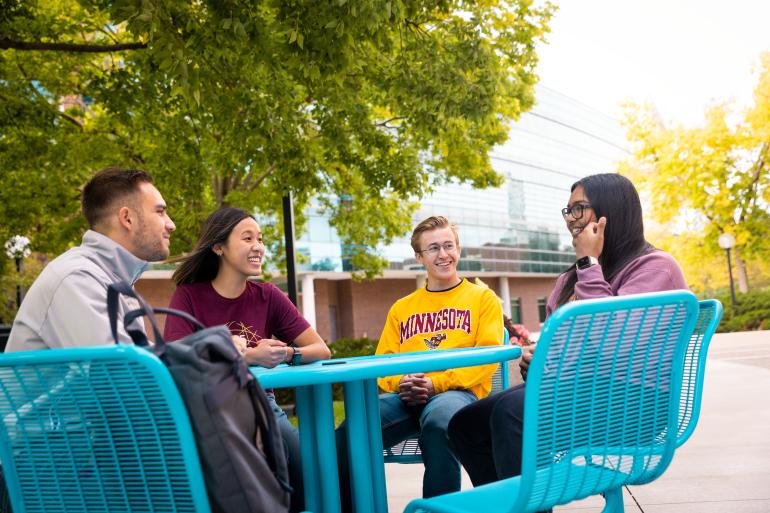Students Transferring Within the U of M Twin Cities

Attend an Information Session
Prospective students are encouraged to attend a Transfer Admissions Information Session, which will include:
- An overview of the Carlson School and the application process.
- An opportunity to talk one-on-one with a member of the Transfer Admissions team.
Eligibility
- Prerequisite courses must be completed with a C- or better before entering Carlson. Prerequisite courses can be in progress during your application period. If admitted, your admission will be contingent upon the successful completion of your prerequisites in progress with a C- or better.
- ECON 1101 Microeconomics or APEC 1101 Principles of Microeconomics
- BA 2051 Modeling Business Scenarios in Excel (Alternatives at local colleges or Universities can be found here)
- BA 2551 Business Statistics in R (or STAT 3011 or STAT 3021 or ESPM 3012 at UMN-Twin Cities.) If you completed an equivalent of STAT 3011 or STAT 3021 from another institution, please reference this document.
- ACCT 2051 Financial Reporting or APEC 1251 Principles of Accounting
- If your intended major is Accounting or Finance, and you do not take ACCT 2051 at UMN-Twin Cities, you will later need to take a pretest for ACCT 5101 Intermediate Accounting to complete the major. More information found here.)
- Minimum 3.0 GPA
- Freshman students in their first semester (even with PSEO or Dual Enrollment Credit) are not considered for Spring admission
Scholarships
- Students admitted from within the University of Minnesota Twin Cities will be invited to apply for current student scholarships upon admission.
- The Carlson School awards over $2 million scholarship dollars annually with award amounts ranging from $1,000-$7,500 per year.
- Applicants are encouraged to complete and submit the Free Application for Federal Student Aid (FAFSA) for best consideration of scholarship awards.
- The selection criteria can include academic achievements, extracurricular and leadership activities, place of residence, financial need and contribution to diversity.
Application timeline: Fall Admissions
Application Opens | Application deadline for Fall semester consideration | Decisions announced |
|---|---|---|
December 1 | February 1 | March 22 |
Application timeline: Spring Admissions
Application Opens | Application deadline for Spring semester consideration | Decisions announced |
|---|---|---|
September 1 | October 1 | November 3 |
Frequently Asked Questions
Transfer admission is competitive and based on a holistic review of the applicant’s academic record, writing skills, experiences beyond the classroom, and personal essay. Admission consideration factors include but are not limited to:
Academic Factors
Because academic preparation is key to student success in college, the strongest consideration in the decision is given to a student’s academic preparation. The following academic factors are considered:
- Coursework in preparation for Impact Core (prerequisite courses)
- Grades in academic coursework
- Grade Point Average
- Rigor of academic curriculum
Context Factors
Individual circumstances are also considered as part of the overall assessment of each application. Enrolling a diverse student body—with students bringing differing experiences, talents, and perspectives to their scholarly community—is essential to achieving the development outcomes of a University of Minnesota education.
Our holistic review takes into consideration the individual circumstances that make each individual student unique. While we do not consider an applicant's race and ethnicity, we consider the following context factors in our decision review:
- Evidence of exceptional achievement, aptitude, or personal accomplishment not reflected in the academic record
- Participation in extracurricular activities related to your intended major
- Strong commitment to community service, leadership, and educational involvement
- Evidence of having overcome social, economic, or physical barriers to educational achievement
- First-generation college student
- Significant responsibility in a family, community, job, or activity
- Contribution to the cultural, gender, age, economic, or geographic diversity of the student body
- Personal or extenuating circumstances
- Military service
- Information received in the open-ended questions
No. In order to maintain a fair and equitable review process, we hold all prospective transfer students to the same standard to complete the prerequisite classes as stated above.
Impact Core (I-Core) is a signature experience of the undergraduate program. I-Core includes foundational courses in business taken together as a 24-credit cohort experience across two semesters. It is during the I-core semesters in which students will declare their major.
After completing the prerequisites, students should continue to complete any remaining liberal education courses not met by the Carlson School curriculum:
- Biological Science
- Physical Science
- Historical Perspectives
- Arts/Humanities
- Literature
- Environment Theme
- Technology and Society Theme
Students can also take some of the required Impact Core classes that offer Non-CSOM sections (HRIR 3021, IDSC 3001, SCO 3001, MKTG 3001).
Plan registration as if you have not been admitted. Rest assured, seats are reserved in Carlson School classes for all newly admitted transfer students. If admitted, you will register during orientation.
Students should work with their current academic advisor to create a parallel plan as a backup. Admissions are competitive and not a guarantee. Prerequisites can be used towards our Management Minor and additional programs at the University. Visit majors.umn.edu to explore business-related majors.
We assume it will take successful applicants 2.5 years to complete their Carlson degree once admitted into Carlson. This can be demonstrated by the Transfer Planning Guide.
The first page is the classes all Carlson students must take, the second page is the Liberal Education Requirements, and the final page is a transfer sample plan.
Current UMN Twin Cities students can request a "What-If" APAS report with any UMN Twin Cities Major. Prospective applicants are encouraged to do so with any Carlson Major of their choosing and feel free to eliminate what they can from this guide to see what they have left.
If you have questions, please complete the Contact Us form at the bottom of this webpage.
Questions?
If you have questions, please get in touch with our enrollment advisor:
Jacob Osterman
he/him/his
